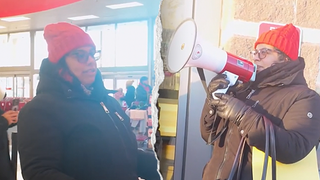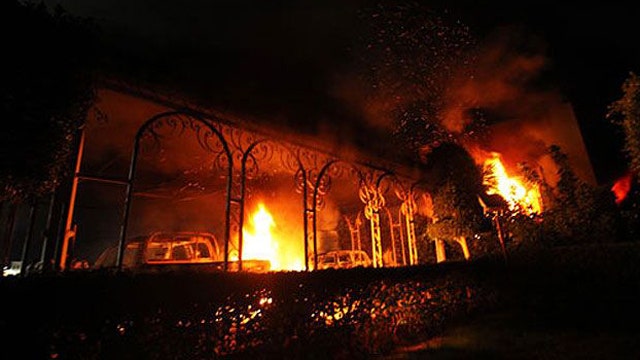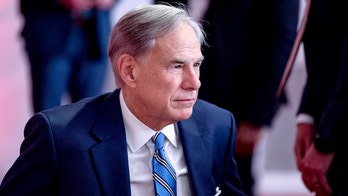What Really Happened In Benghazi
Kris “Tanto” Paronto and John “Tig” Tiegen,co-authors of “13 Hours: The Inside Account of What Really Happened In Benghazi” believe that they could have saved Ambassador Stevens and were shocked no help came during the battle.
It was exactly two years ago that Islamic militants attacked a U.S. compound in Libya, killing four Americans -- including U.S. Ambassador Christopher Stevens -- and touching off a major political controversy that divides Washington to this day.
The assault on the compound, a consulate facility in Libya's second-largest city, began at nightfall when more than 100 militants armed with rocket-propelled grenades, AK-47s and truck-mounted artillery closed off streets and moved in on the building where a skeleton crew of State Department workers lived and worked, and where Stevens was visiting from his office in Tripoli. By the time it was over, Stevens, career Foreign Service worker Sean Smith and two CIA contractors who had come to their rescue, Tyrone Woods and Glen Doherty, were dead.
But controversy over what really prompted the attack and what the highest level of the U.S. government did or did not do in the face of it continues to swirl on Capitol Hill. The White House initially portrayed the attack, which came just two months before the 2012 presidential election, as a spontaneous event triggered by Muslim outrage over an obscure online video deemed insulting to Islam. But the narrative crumbled in the months that followed, as witnesses described a coordinated attack and some even charged that service members stationed nearby were ordered not to intervene.
[pullquote]
On Sept. 17, a House Select Committee on Benghazi, which has been taking depositions from several witnesses who were close to the scene or the decision-making process, will hold a public hearing that Republicans say is aimed at getting at the truth about what happened before, during and after the attack and why four Americans were killed.
“It is for them that we must establish all of the facts of what happened in Benghazi, beyond any reasonable doubt," said Select Committee on Benghazi Chairman Trey Gowdy, R-S.C. "And it is for the American people, and those who serve our nation overseas -- to restore their faith and confidence -- that the Committee will establish the facts in a fair and impartial manner.”
Three members of a U.S. security team stationed nearby told Fox News last week that they were held back from immediately responding to the attack on the American diplomatic mission on orders of the top CIA officer there. Speaking out publicly for the first time, the three security operators at the secret CIA annex in Benghazi said word of the attack reached the CIA annex just after 9:30 p.m. Within five minutes, the security team at the annex was geared up for battle, and ready to move to the compound, a mile away.
“Five minutes, we're ready,” Kris (Tanto) Paronto, a former Army Ranger, told Fox News. “It was thumbs up, thumbs up, we're ready to go.”
But according to the security operators, they were delayed from responding to the attack by the top CIA officer in Benghazi, whom they refer to only as “Bob.”
“It had probably been 15 minutes I think, and … I just said, ‘Hey, you know, we gotta -- we need to get over there, we're losing the initiative,’” said John (“Tig”) Tiegen, another of the three security operatives. “And Bob just looks straight at me and said, ‘Stand down, you need to wait.’”
They described desperate calls from the State Department employees trapped in the compound, and said that they believe they could have saved the victims' lives if they had been permitted to.
But The White House and Democrats have dismissed the claims, and the incident in general, as an "old story." Rep. Adam Schiff, D-Calif., a senior member of the Select Committee on Benghazi, said the "so-called new allegations" have been examined by previous House and Senate committees which all concluded that there was no 'stand down' order.
"These old myths are resurfacing at a time when the Select Committee is preparing to hold its first hearing on how well the State Department is implementing the recommendations of the Accountability Review Board," Schiff said. "I hope that the Committee won't divert its attention away from what could be a valuable part of the 'lessons learned' from Benghazi to re-litigate baseless claims that have been debunked time and again, and in bipartisan fashion."
Stevens was the first U.S. ambassador to be killed on duty since 1979, when Adolph Dubs, America's top diplomat in Afghanistan, was killed by militants in Kabul. The Benghazi story is certain to play a major role in the 2016 presidential elections should Hillary Clinton, who headed the State Department and has been accused of ignoring requests for beefed up security in Libya prior to the attack, choose to run for president.













































